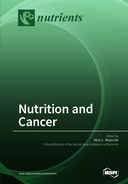Explore

The development and treatment of cancer presents a complex interaction between tumor and host. Provision of nutrients not only enables the maintenance of nutritional status, but also provides substrates and signals for immunity, tumor metabolism and protection of the host from treatment toxicities. Fat is one dietary element that has been explored for its role in cancer development. While the bulk of these studies have been observational or experimental, the evidence assembled suggests that dietary lipids behave uniquely to prevent or promote cancers. An additional aspect of cancer development is the role of adipose tissue as a source of, and a responder to, inflammatory signals that may be involved in tumor development. This Special Issue of Nutrients focuses on fat and cancer. The contributors to this Special Issue are well-recognized leaders in the field of cancer and have unique areas of focus including metabolism, immunology, biochemistry, epidemiology and nutrition. Each contribution highlights the latest research in these areas and what is known about fat and cancer with topics ranging from diet and cancer prevention, mechanisms of n-3 fatty acids on tumor development and the role of adipose tissue in cancer development and progression.
This book is included in DOAB.
Why read this book? Have your say.
You must be logged in to comment.
Rights Information
Are you the author or publisher of this work? If so, you can claim it as yours by registering as an Unglue.it rights holder.Downloads
This work has been downloaded 145 times via unglue.it ebook links.
- 77 - pdf (CC BY-NC-ND) at Unglue.it.
Keywords
- adipose
- chemotherapy
- dietetics
- Fatty acids
- Lipids
- nutrient requirements
- nutrition and metabolism
- oncology
- tumor
Editions


